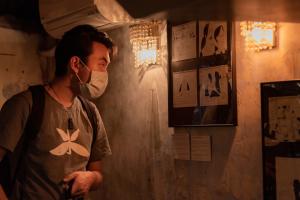Exhibition: Pollution, Data, Activism, 03.20.2021

This collection documents a talk and exhibiton about the Formosa Plastics Global Archive, held on March 20, 2021 at 柏林廢墟Tacheles in Taipei, Taiwan.
Photo Essay: Exhibition 03.20.2021
Photos from a talk and exhibiton about the Formosa Plastics Global Archive, held on March 20, 2021 at 柏林廢墟Tacheles in Taipei, Taiwan. All photos by Jiao Enguan 焦恩光.

pece_annotation_1473109654
josh.correiraThe author is Sonja D. Schmid who is a professor of Science and Technology in Society at Virginia Tech. Her area of expertise is the social aspect of science and technology, esp. during the Cold War, as well as science and technology policy, science and democracy, qualitative studies of risk, energy policy, and nuclear emergency response. As a professor and researcher she has does relevant studies on Fukushima and nuclear disasters relevant to the DSTS network. One such article titled "The unbearable ambiguity of knowing: making sense of Fukushima" is cited below:
Schmid, Sonja D. "The Unbearable Ambiguity of Knowing: Making Sense of Fukushima." Bulletin of the Atomic Scientists. N.p., 2013. Web.
pece_annotation_1473112332
josh.correiraI have not found any opinions in the news about the program but several other educational institutions have released announcements about the program appearing to be advertisements.
pece_annotation_1473634206
josh.correiraThe data for this report was obtained over a period from the earthquake in 2010 to 2012.
pece_annotation_1474515346
josh.correiraOne major point outlined in the article is the way that disease outbreaks have been viewed and prepared for has changed over the past few centuries. It started out in the view of public health where social factors like sanitation and clean water were valued but then shifted towards preparedness after outbreaks of various influenza viruses seemed to not fit the paradigm of public health.
pece_annotation_1475597865
josh.correiraThe organization has the infrastructure of the Federal government, however they operate in areas that are more rural, including Alaska and the Southwest where environmental issues such as clean drinking water can be present, which they address in their community health approach. All members also are allowed access to the internet, which I'm assuming is available at each of their locations.
pece_annotation_1473109775
josh.correiraEmergency response is addressed in this article as mentioned above, stating how it should be the focus of disaster prepardness instead of disaster prevention. Schmid also discusses the important components necessary in an emergency response team including analysis of previous disasters and experience from disaster relief organizations like the UN, and improvisation instead of comparing one disaster to another as no two disasters are identical.

Translation of the event description into Mandarin.